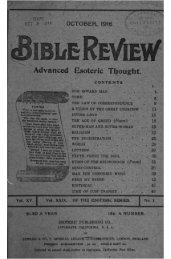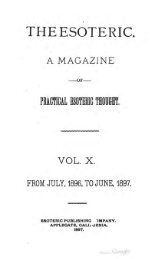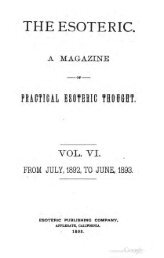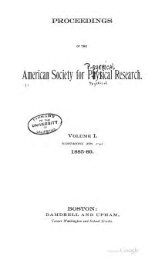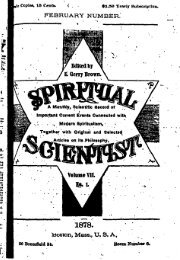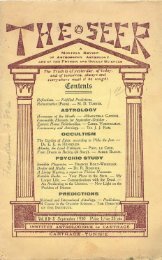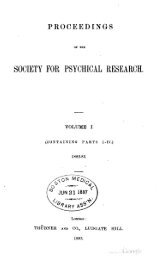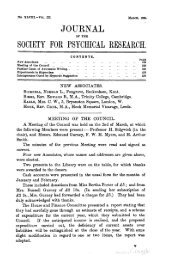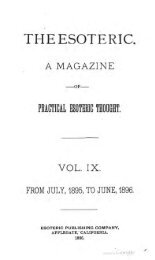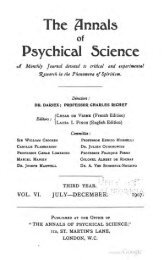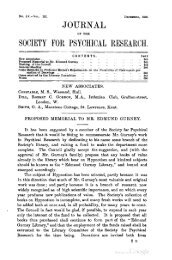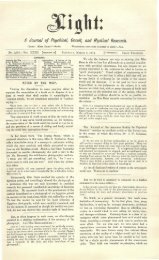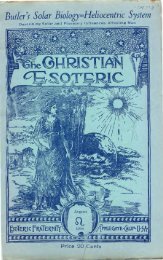Light V1 May 1881 - Iapsop.com
Light V1 May 1881 - Iapsop.com
Light V1 May 1881 - Iapsop.com
You also want an ePaper? Increase the reach of your titles
YUMPU automatically turns print PDFs into web optimized ePapers that Google loves.
Jig ht:<br />
A Journal devoted to the Highest Interests of Humanity, both Here and Hereafter.<br />
No. 19. SATURDAY, MA.Y 14, <strong>1881</strong>. PRICE TwoPBNCJt.<br />
CONTENTS.<br />
Tiie Jlellri1111 of the FRtare ......... 145 I Kr. Newton Ct-ooland'1 New !look. US<br />
·fteOueol Kn. Fletoher .........•• 146 , Thonght-Beadingb7 Kr. Washing·<br />
boportut to Kedieal Men ......... J-16 l ton lniaav: Biahop.... . . • • • • • • • • 1411<br />
Tiie 8pim...u...a of llcienoe ... . ... 1'4 ! Spirit Teiachinp. B7 K. A. (Oxon) 149<br />
l!enlou Spbita; _and the " Plea- I =·""'1lam bi Bl«h P1- ... ••• 160<br />
- of tlie Table " •••••............ 1''1 enta with -sealed Blatea • • 151<br />
BoMI b7 the Wa7 ........•............... as 8 te who LoYe Drlnlc •..• •••..• 141<br />
.&&ir.e of the Bon. Pel'CJ WJDd· Our Oontemporariea ••• •••••••••... 151<br />
.... K.P. • • • • . . • . . . . • . . . • . • • • 148 Loudon and ProTinclal Bocletiel.. 152<br />
THE RELIGION OF THE FUTURE.<br />
We recently noticed a volume which deals with the engrouing<br />
111bject of the Faith of the Future,* and now we find three<br />
o&her volumes all dealing with the aame subject in various ways.<br />
Two of the authors, Hr. Binneyt and Hr. Farmer,t diatinctl7<br />
advocate the cl.aima of Spiritualism aa a factor in that remodelled<br />
Faith. Hr. Crozier's§ object ia rather "to separate as far as<br />
poatible the non-euential and tra.naitory elements of religion<br />
from the elleJlt.i&l and perennial." Bia aim ia to cleanse the<br />
old mher than to formulate the new; as he says, "to unite<br />
religio111 thinkers of all clauea in a <strong>com</strong>mon stand against<br />
Xateri&liam and Atheiam." Carlyle, Emerson, and Herbert<br />
Spencer are the teachers whom he selects for analysis, and hia<br />
cloee and well-auatained argument ia a very considerable con·<br />
tn"but.ion to the attainment of the object he aets before him.<br />
Oar read.era, however, are hardly likely to be in much sympathy<br />
with Haterialiam or Atheiam, and we may, therefore, turn to the<br />
TI>lumea that more immediately concern ua as Spiritualists.<br />
Hr. Binney traveraea well-wom ground in his attempt to<br />
llhew that the ai.mple and practical teachings of Jeana Chriat<br />
l5Jrd. onl7 a very slender foundation for the lofty theological<br />
mpentructure that has been built upon them. Outside of the<br />
Churches few will differ from his ooncluaions ; and even within<br />
the pale of the Christian Churches there are many, that are not<br />
the alavee of Church ayatema, that are not bound in the fetters of<br />
a creed that ia enforced by relentleae anathema, who will aaaent<br />
to many of the author's propositions, even if they cannot accept<br />
all his concluaiona. It ia idle to expect auent from those who<br />
have grown up in orthodoxy, whose minda have beoome warped<br />
t.o fit the groove in which they have been trained, and over whose<br />
thoughta-if, indeed, they have ever thought on subjects<br />
l'lllpeCting which to think ia sin, in their estimation-no breath<br />
of doubt has ever paued. For them their Faith ia all sufficient ;<br />
and in the poueuion of it they may well be left undisturbed.<br />
Ii is not a light thing to take away that <strong>com</strong>fortable doctrine<br />
which can onl7 be replaced, if at all, by deep aearchinga of heart,<br />
bf reatleae questioning, after poaaible despair. &quiucat in pace!<br />
Mr. Binney addreuea those who are not disinclined to take the<br />
trouble of thinking for themselves, and who feel some diaaatiafaction<br />
with the modem phase of the Christian faith in which<br />
they have been brought up.<br />
We ahall not profeu to analyae his methods. Substantially<br />
they are correct, and the volume has the manifest advantage of<br />
patting, with some clearneae, before the uninstructed public<br />
&eta familiar to trained students of theology. The author,<br />
indeed, diaclaims any deep knowledge. He takea tle Engliah<br />
Bible as he finda it, and uses it alone u his iext-book. From it<br />
he draws the teachings of Christ and Bia Apostles, so far as he<br />
&ads them there; and with them he contrasts very eft'ectivel7<br />
the divergent creeds of the Chriatianity of to-day-the Catholic,<br />
the Prot.tant of the Church of England, the Baptist, the<br />
Hethodiat, the Unitarian, the 10,000 aectaries who name themllelvea<br />
by the name of Chriat, and do such despite to Bia<br />
teaching.<br />
• ~ F~ of the BellsioD of the Future. "LIGBT," April Ind, J881 .<br />
t The Ballgion of 1-oompared with the ClarlatlanltJ of to.cta,. B7 Fred.<br />
1. :atue,. LODdon : B. W. A.Uen.11, ~.,.Marla-lane.<br />
t ~ N- Bula of Belief ID Immortalltr. B7 J. 8. Farmer. London 1 E. W .<br />
.W.. U. ~ft Marla.lane.<br />
f'l'lle Bellidoll of the htara. B7 J, B. Oroder, Jl.B. 1-don: 0. Kepn<br />
PulllMl Oo.. f, ~.aqure.<br />
It ia easy to picture the contrast. On the one hand we have<br />
the simplicity of Chriat in its native grandeur ; the voice of the<br />
Great Reformer who so stirred men's hearts by the directneu of<br />
Bia teaching, and the holineu of Bia life. Bia practical<br />
<strong>com</strong>mandments were those which all men agree to reverence.<br />
"If ye love Me keep My <strong>com</strong>mandments "--against murder,<br />
adultery, theft, fraud, slander ; treat all men as you would have<br />
them treat yourselves ; honour your parents, and love your God.<br />
Above all it is the life, not the beluf that saves a man. Therefore,<br />
cult~vate non-resistance, love of enemies, almsgiving, humility,<br />
forg1veneaa, mercy, unselfishneaa, self-denial, righteouaneaa<br />
faith in God, prayer, doing good, and behaving to others as yo1;<br />
would have them behave to you. Avoid worldly cares, covetoua·<br />
neu, hypocrisy, self-glorification, ambition, condemning others,<br />
surfeiting and drunkenneu. Such in broad outline was the<br />
practical teaching of Christ; and to the living of this life waa<br />
attached the promise of aalvation, and not, be it observed to<br />
belief in any of the dogmas which have since occupied s~ch<br />
prominent plaoea in the Christian ayatemt. It ia true He claims<br />
from Bia followers belief in Himself, but this belief, He makes<br />
distinctly clear, means obedience to Bia <strong>com</strong>lll&J'dments and<br />
teachings.<br />
Salvation, according to Chriat, ia to be had by cultivating a<br />
truthful, benevolent, charitable, and unael.fiah disposition,<br />
exemplified by kindly deeds and an upright life.<br />
On the other hand, we have the varioua <strong>com</strong>plex syatema<br />
which pus current in Hia name - all pouellling, it may<br />
be. hoped, some germs of Bia truth, but all overlaid by<br />
the accretions of ages, with the figments of human fancy,<br />
with the dogmas that have been forged from age to age<br />
for enslaving human minda and binding them in fetters<br />
which make liberty of thought and action hopeleaa. The<br />
Thirty-nine Articles, the Athanaaian Creed, the W estminater<br />
Confession-how do theae consort with the simplicity of Chriat 1<br />
Sanctification and Juatification, Fate and Free-will, Predestination<br />
and Election, Sacramental Gr:M:e-of theae and kindred<br />
dogmas the Churches are full, and every page of Church<br />
history briatlea with the reoord of confilcta in which theae man·<br />
made doctrines have fought with and driven out the true spirit<br />
of Chriat. The picture ia not unfairly drawn in thia volume.<br />
The part, however, which is novel in such a book ia that<br />
devoted to the consideration of the teachings of Modem<br />
:Spiritualism : a creed which olaima, as our author alleges, " to<br />
be eaaentially Christian, reconciles science with religion, and<br />
proves to all creeda the uaeleuneaa of doctrinal squabbles, !Qld<br />
the neoeuity above all elae of cultivating the inward spirit,"<br />
seeing that it ia the spirit that ii the real man. Thia argument<br />
ia full of interest, and the author makes out a very strong case<br />
for the claima of Spiritualism to be the truest representative of<br />
Christ's teaching-the modern representative of Primitive<br />
Christianity-the oiily system "that gives a just and intelligible<br />
theory of the life after death." The case ia temperatelt and<br />
even tentatively put ; but, aa Mr. Binney goea on, we see the<br />
argument powerfully uaed for confuting no leu formidable a<br />
critic than W. R. Greg. We can but refer our readers, and<br />
especially thoae who wiah to know what can be said for<br />
Spiritualism as a religion, to thia excellent and convincing<br />
argument.<br />
Mr. Fanner's volume ia a aecond edition of what, il we<br />
remember rightly, was first called "Spiritualism as a new baais<br />
of belief." ~piritualiam as a word has, however, be<strong>com</strong>e<br />
IUllOCiated, the author thinks, with so much that ia undesirable<br />
that he ia fain to drop it and sail under ot.her coloUI'll. We are<br />
not of that way of thinking. We did not choose the word ; we<br />
do not admire it u a word ; but, for good or evil, that which<br />
we are concerned with ia known by that name, and we propose<br />
to cleave fut to it. Let the "ohicanery, fraud, credulity,''<br />
that Mr. Farmer holda up hia handa at, change its name, or<br />
rather cease to borrow that to which it has no title. For<br />
Digitized by Google



